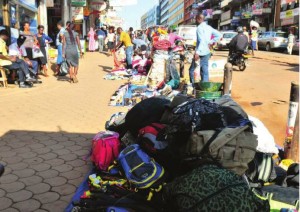Kampala City traders, vendors face off again over sprawling street ‘markets’

If the hordes of vendors that have flooded the streets of Kampala once again are to have a wish, it will be that the election period gets even longer. In the wake of the Presidential elections over the last three months, the vendors knew that the city authorities would be reluctant to harass them off the streets because President Yoweri Museveni was desperate to get votes. Consequently, the streets in the Central Business District are teeming with vendors selling all sorts of merchandise ranging from fruits and vegetables to cooking utensils and clothes.
The shop keepers are bitter because they say they have an arrangement with Kampala Capital City Authority (KCCA). They pay trading license fees and rent worth millions of shillings daily yet they can hardly make a sale because of the vendors. In a few days, the traders are saying they will stage industrial action to make their case. But despite the freedom they were accorded, the vendors still denied Museveni votes, and the President attributed his loss in the city to the actions of KCCA Executive Director Jennifer Musisi to kick vendors off the streets without giving them an alternative livelihood.
Seated in his garments shop on Luwum Street, a visibly disappointed Hassan Katabalwa says the vendors are a menace. “When people are walking on the streets, they don’t not consider our goods inside the shop. They will first go to the vendors. To make matters even worse, the vendors are also making the city dirty,” he says, pointing at the vendors’ merchandise that has almost blocked the entrance to his shop. Katabalwa says he pays rent amounting to Shs 5 million a month and he does not want to deal with the burden of fighting vendors in front of his shop because he pays for a licence.
Street vendors have posed a dilemma for city administrators in developing countries for decades. A 2003 report by the Institute of Development Studies at University of Nairobi under the title; Street Vending in African Cities; A synthesis of Empirical Findings from Kenya, Ivory Coast, Ghana, Zimbabwe and South Africa, indicated that many people earn income from street vending but are ignored by government. The report stated that in all the cities covered, street trade was rampant and a source of employment and income for many urban dwellers. However, in most of the countries, it was uncounted and unrecognised in national economic statistics. Additionally, it stated that street trade was in the past viewed as an underground activity that undermined the healthy function of the formal economy.
The report stated that this perception had resulted in conflicts with urban authorities over rising crime rates, licensing, taxation, site of operation, sanitation, traffic congestion and poor working conditions. That is the exactly the case in Kampala.
It is for this reason that KCCA has often sided with the traders against the vendors whom they view as an impediment to the development of Kampala into a modern metropolis.
Flavia Atuhaire, a sales executive at a Bata shop, says even the high end shop which sells shoes of an average of not less than Shs50, 000 are affected by the vendors. “People no longer consider items in shops when they can get them at half the price on the streets.” She says although Bata has its set of loyal customers, people who buy things like bags from the shop have gone down in the last few days. Atuhaire also says the most affected will be people who sell clothes in malls.
Issa Sekitto, the spokesperson of Kampala City Traders Association – KACITA – says the body has written to the KCCA Executive Director, the President, Inspector General of Police, the Minister for Kampala and set their ultimatums. “If KCCA does not get the vendors off the streets by March 9, we shall take industrial action. If it means putting our stock in the middle of the roads for us to make our point, we shall do it because we have had enough. The government is aware of our actions and there is nothing like we have not made any communications.”
Officials of KCCA have wowed to maintain their stand. Moses Atwiine, the KCCA director of physical planning, says the vendors are on notice to vacate as soon as possible beginning mid-March. “We are going after those who are still on the streets,” he said.
Embattled Lord Mayor Erias Lukwago, who has now been re-elected, has however given his backing to the vendors saying KCCA must follow laws and established guidelines before instituting some of its policies, which have left a number of people disgruntled.
A street vendor who spoke to The Independent said for the moment they are enjoying the free reign handed to them by the election period but admitted that it was not a question of if KCCA would mount a crackdown but when.
Indeed for now, the vendors are enjoying their stay on the streets due to the political contests in Kampala that have handed them a respite but it will certainly be only a matter of time before their economic bliss comes to an abrupt end.
 The Independent Uganda: You get the Truth we Pay the Price
The Independent Uganda: You get the Truth we Pay the Price



